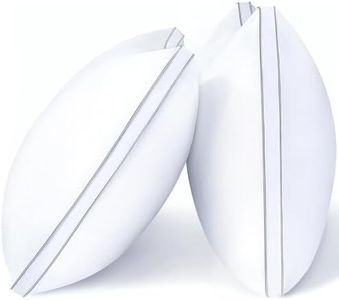We Use CookiesWe use cookies to enhance the security, performance,
functionality and for analytical and promotional activities. By continuing to browse this site you
are agreeing to our privacy policy
10 Best Stomach Sleeping Pillow
From leading brands and best sellers available on the web.Buying Guide for the Best Stomach Sleeping Pillow
Choosing the right pillow for stomach sleeping is an important step towards better sleep health and comfort. Stomach sleepers have unique needs because this position can sometimes strain the neck, shoulders, and lower back. The main goal is to keep your head, neck, and spine in alignment, so picking a pillow with the right features is essential. Pay attention to key specs that relate to thickness, firmness, and material, as they will determine how comfortable and supportive your pillow will be. By understanding what each feature means and how it matches your personal sleeping habits, you can find a pillow that will help you sleep soundly and wake up feeling refreshed.Loft (Pillow Height)Loft describes how high or thick the pillow is when it's lying flat. For stomach sleepers, loft is very important because a pillow that’s too thick can push your neck upwards out of alignment, causing discomfort or even pain. Generally, low loft pillows (around 2-3 inches or less) are best for stomach sleepers, as a thin pillow keeps your head closer to the mattress and reduces strain. If you tend to tuck your arm under the pillow, you might want a slightly higher loft, but in general, stick to a thinner pillow for better alignment. Consider your body size and mattress softness; if your mattress is softer and you sink in, you may get away with a little more lift from your pillow.
FirmnessFirmness refers to how soft or hard the pillow feels when you lie on it. For stomach sleepers, a soft or plush pillow is usually ideal, as it allows your head to sink in comfortably without lifting it too much. A medium firmness can also work for those who want a bit more support, but typically, avoid very firm pillows, since they can force your head back and strain your neck. Your preference for support and the amount of cushioning you enjoy can help you decide, but always keep comfort and neck health in mind.
Pillow MaterialThe material inside the pillow plays a big role in its feel and support. Common materials include memory foam, down, feather, and synthetic fills. Memory foam offers gentle, conforming support but can sometimes feel a bit firm for stomach sleepers unless designed to be low-loft and soft. Down and feather pillows are softer and more moldable, making them popular for this sleeping position. Synthetic fills mimic down and are a good hypoallergenic alternative. Choose a material that matches your comfort needs—down and soft synthetics are usually best for stomach sleeping, but consider if you have allergies or require easy maintenance.
BreathabilityBreathability means how well the pillow lets air move through, helping you stay cool during the night. Stomach sleeping puts your face close to (or into) the pillow, so a pillow that traps heat can make you sweaty and uncomfortable. Most natural fills like down, or pillows with special cooling technologies, promote better air flow. If you often feel hot at night, prioritize breathable materials or those specifically designed to stay cool. Your comfort in terms of temperature should guide how much you value this feature.
Shape and AdjustabilitySome pillows are adjustable, allowing you to add or remove fill to change the height and feel, while others have a contoured or flat shape. An adjustable pillow lets you customize it exactly for your head and body type, which is great if you’re not sure what loft will work best. Flat or classic shape pillows are simple and usually work well for stomach sleepers, while contoured shapes are often best left for back or side sleepers. Choose adjustability if you want to try different heights, but stick to flat and simple designs for a straightforward stomach-sleeping pillow.















